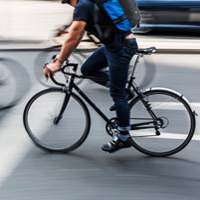Trolley Track Hazards in Philadelphia
May 6, 2018 Although Philadelphia’s #23 trolley hasn’t been in service along miles of roadways (such as 11th and 12th streets, as well as Germantown Avenue) for more than 20 years, sizable portions of the tracks still remain. These trolley tracks create substantial physical hazards – primarily for bicyclists commuting to work or cycling for fun throughout. To make improvements the city has paved over certain stretches of the trolley tracks, but hasn’t yet made enough of an impact to adequately limit the risk for accidents that they create.
Although Philadelphia’s #23 trolley hasn’t been in service along miles of roadways (such as 11th and 12th streets, as well as Germantown Avenue) for more than 20 years, sizable portions of the tracks still remain. These trolley tracks create substantial physical hazards – primarily for bicyclists commuting to work or cycling for fun throughout. To make improvements the city has paved over certain stretches of the trolley tracks, but hasn’t yet made enough of an impact to adequately limit the risk for accidents that they create.
It probably comes as no surprise that bicycling is extremely popular in the city. According to the Bicycle Coalition of the Greater Philadelphia Area (BCGP), just ten years ago there were already an approximate 36,000 bicyclist commuters in the area – and that number doesn’t include the thousands of others who occasionally commute to work via bicycle or simply ride for pleasure.
Just last year, 3 bicyclists were fatally injured in crashes across the city. The year before that, 4 were killed in traffic related crashes. Thousands of others have sustained injuries ranging in severity, many of which include broken bones and/or head injuries. Because bicyclists are especially vulnerable to their physical surroundings, (e.g. cars, trucks, pedestrians, stationary objects, etc.) limiting controllable hazards like the presence of out-of-use trolley tracks would help prevent accidents that result in injury or death.
One of the BCGP’s members began her fight to pave over the #23’s unused tracks after being in her own accident. In 2011, Katie Monroe was biking along 11th street when she tried to cross over the tracks at Reed street. Unfortunately, her wheel slipped and went into the track, causing Monroe to fall and hit the ground. Although she was wearing a helmet, she shattered five of her teeth and broke her jaw in three places.
Monroe’s accident inspired the BCGP to spring into action with their campaign against the trolley tracks; in 2014 the group began talks with SEPTA and the Mayor’s Office of Transportation and Utilities (MOTU). As a result, the MOTU agreed to begin repaving some of the highest volume stretches along 11th and 12th streets. MOTU’s chief of staff said that the office was unable to repave additional areas at the time because under the limited budget, the improvements were considered as “discretionary expenses”.
Something that compounds the issue even more is the influx of popular bike share programs (such as Indego), which are now widely available throughout the city. Indego has more than 500 bikes in over 60 locations citywide. The program isn’t costly, helps to cut back on pollution from motor vehicle emissions and allows those who don’t own bikes to easily access them – but beware warns the BCGP, because it also means that there is now a greater number of inexperienced bicyclists on the roadways.
Although Monroe sustained serious injuries from her trolley track-related fall, she made a full recovery. Luckily she wasn’t struck by a car or truck when she fell off her bike, which is a risk that all cyclists face. Because it’s easy for bicyclists to unexpectedly lose control when riding on trolley tracks, it’s advisable to avoid them as much as possible. If you are biking near the trolley tracks and are unable to avoid them, try to navigate across them at a perpendicular angle to decrease the likelihood of falling. Keep in mind that just like in Monroe’s case, this won’t always work.
Even though some local residents advocate for maintaining the tracks in case service for the #23 trolley is ever restored, the truth is that they produce unnecessary hazards for bicyclists who already face numerous dangers while riding in a city with high-volume traffic and always-changing traffic patterns. On the other hand, the trolley line in question hasn’t been in service for more than 20 years. For all these reasons, members of the BCGP (as well as others) continue to put pressure on city officials and SEPTA to reinvigorate its repaving project.
City and state legislators should work tirelessly to ensure that they are protecting people as best as they can. It’s essential that the city continue taking protective measures for bicyclists, like prioritizing solutions for especially dangerous intersections and busy areas. Repaving stretches of trolley tracks may be an expensive task, but it’s also one that would prevent bicyclists from avoidable injuries, some of which can be fatal. As long as one of the city’s main goals is to promote the health and safety of its residents, changes that better keep people safe will continue to occur.
There are lots of ways to make sure that your voice is heard. If you’re concerned about the #23 trolley tracks and the risks they create for bicyclists, you can get involved with the BCGP to make a difference.
Philadelphia Bicycle Accident Lawyers at Galfand Berger, LLP Represent Injured Biker Riders
If you or a loved one has been injured in a bicycle accident, please contact our experienced bike accident lawyers in Philadelphia. Galfand Berger has offices located in Philadelphia, Bethlehem, Lancaster, and Reading, and we serve clients throughout Pennsylvania and New Jersey. To schedule a consultation, call us at 800-222-8792 or complete our online contact form.
 Google Screened
Google Screened
